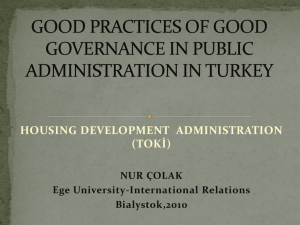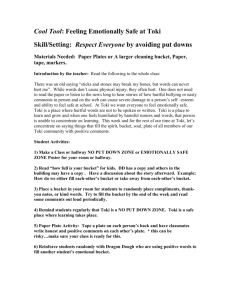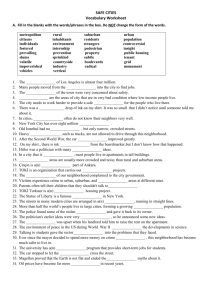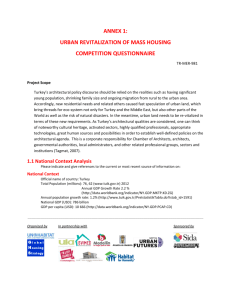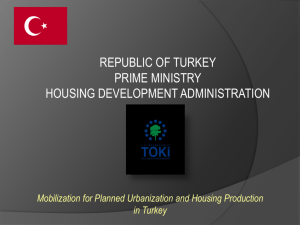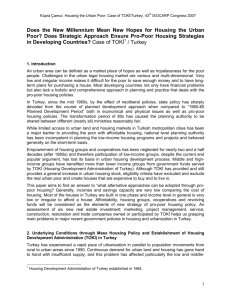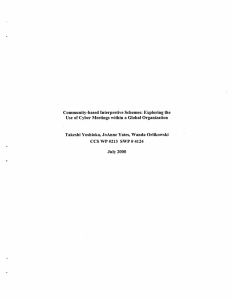nur MAKALE SON HALI
advertisement
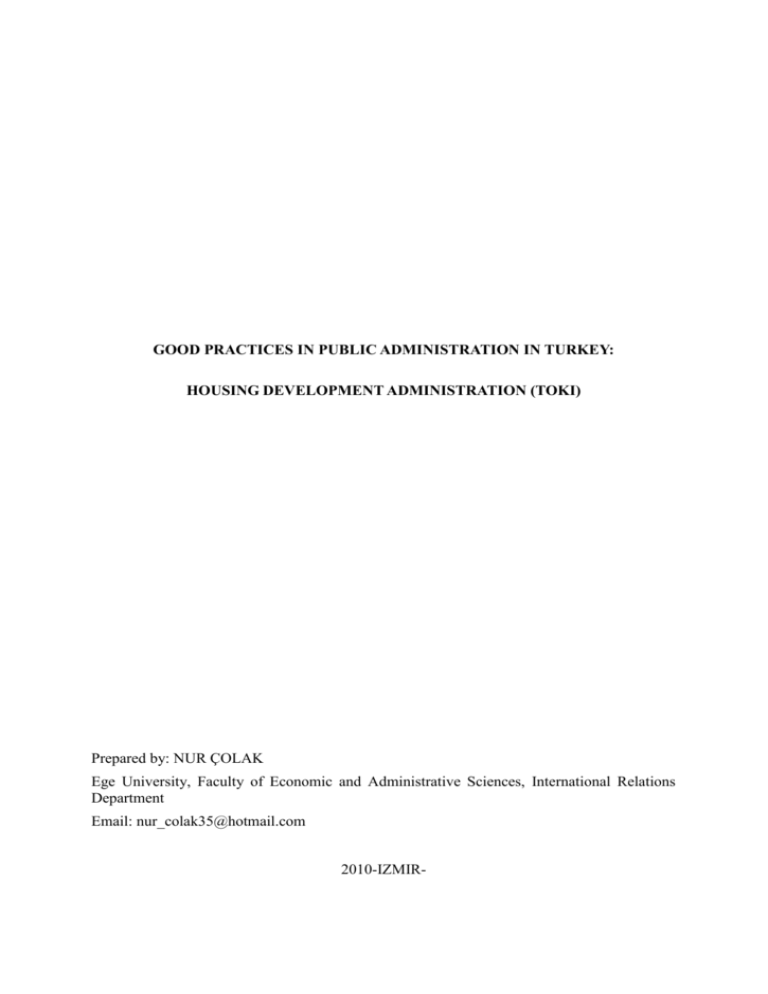
GOOD PRACTICES IN PUBLIC ADMINISTRATION IN TURKEY: HOUSING DEVELOPMENT ADMINISTRATION (TOKI) Prepared by: NUR ÇOLAK Ege University, Faculty of Economic and Administrative Sciences, International Relations Department Email: nur_colak35@hotmail.com 2010-IZMIR- CONTENT 1. Introduction A) Goals of Public Administration Theory B) The study of organization behaviour C) The Importance of “Good Practice” D) Governance- Good Governance and its Responsibilities E) Good Governance’s Characteristics. 2. Chapter 1 A) Major Points Underlying Housing Policy in Turkey B) A New Housing Challenge: Housing Development Administration (TOKI) 3. Conclusion 1. Introduction This essay aimed to explain good practices in public administration such as urban transformation projects in European Integration Process. In this point history, economic development and culture are very important to analyze the urban transformation in Turkey. Responsive and transparent public administration is the basic condition which government strategies achieve the country’s priorities can be implemented. Decreasing costs and improving the efficiency of public administration frees resources for poverty reduction and other development objectives. Then, we should have a look development process of public administration suc as how the public administration can be field of as a study. Public administration as an aspect of governmental activity has existed as long as political systems have been functioning and trying to achieve program objectives set by political decision-makers. Public administration as a field of systematic study is much more recent. Advisers to rulers and commentators on the working of government have recorded their observations from time to time in sources as varied as Kautilya’s Arthasastra in ancient India1, the Bible, Aristotle’s Politics and Machiavelli’s The Prince, but it was not until the eighteenth century that cameralism, concern with the systematic management of governmental affairs, become a specialty of German scholars in Western Europe. In the United States, such a development did not take place until the latter part of the nineteenth century, with the publication in 1887 of Woodrow Wilson’s famous essay, “The Study of Administration” generally considered the starting point. Since that time,public administration has become a well-recognized area of specialized interest, either as a subfiled of political science or as an academic discipline in its own right. Public administration is presumably an aspect of more generic concept-administration,the essence of which has been described as “determined action taken in pursuit of conscious purpose.”2 Most efforts to define administration in general add the element of cooperation among two or more individuals and view it as cooperative human effort towards reaching some goal or goals accepted by those engaged in the endeavor. Administration is concerned with means for the achievement of prescribed ends. Administrative activity can take place in variety of settings, providedthe crucial elements are present: the cooperation of human beings to perform tasks that have been mutually accepted as worthy of the joint effort. The Robert C. Tucker,”Towards a Comparative Politics of Movement-Regimes,”American Political Science Review 60,No.2(1961):283. See also his “On Revolutionary Mass- Movement Regimes,”The Soviet Political mind: Studies in Stalinism and Post-Stalin Change (New York : Praeger,1963).Chap.1,pp.3-19 2 Ibid., p. 91. 1 institutional framework in which administration occurs may be as diverse as a business firm, labor union, educational institutions or governmental unit. Public administration is that sector of administration found in a political setting Concerned primarily with the carrying out of public policy decisions made by the authoritative decisionmakers in the political system, public adminsitration can be roughly distinguished from private, or nonpublic administration. 3 A) Goals of Public Administration Theory Public administration may have two goals which can be separated as being(in concordance with) conceptual.Two major goals are: 1)understanding how people in organizations act and how organizations manage 2)beneficial advise as to how organizations may be organised efficiency. Therefore methods of organization and administration includes the theory of human behavior in organization. B) The study of organization behaviour Persons behavior in organizations can be non- normative that means desires,values and prejudices of the persons are related with analysis of human interaction.”There has been considerable discussion as to whether public administration is concerned with analyzing organization problem sor with giving advice to administratord. Historically speaking, it has in fact been concerned with both. This is perfectly proper,provided that the objective and scientific aspects of the subject are distinguished from the value elements,and provided that the advice as to how to attain these values is based on an objective science of organization behavior.”4 C) The Importance of “ Good Practice” There are many reasons to begin the study of administration. For instance objective analysis of organization activity becomes more important as much as some rules which are based on the methods of successful executive or to operate a government agency. First of all, practical rules can not solve automatic or mechanical organization problems.Administrators who are practical may be find another solution about the problems that is situated formal principles of adminitration. Because understanding psychological process is important to explain the administrative situation. 3 Ferrel Heady,” Public Administration: A Compatative Perspective”, Sixth edition (2001), Chap.1, pp. 1-2 4 Herbert a Simon, Victor a Thonpson and Donald W Smithburg, Public Admisnitration, second printing, New Jersey, 2000, s. 20 Second reason is that skills in administration,especially in practically, is more important than intellectual knowledge. As theoritical knowledge can solve the administratice problems to some degree but, ‘ability’ is a key word at this point. It is important to behave whereas the rules has been learned and practiced. “ A third reason for avoiding a ‘ how –to’ approach in the study of administration has already been mentioned. Practical recommendation for organization action always depend upon the values of the persons making the recommendation. For example,a person primarily in interested in doing a job efficintly may make a recommendation different from that of a person interested in doing the job so as to preserve democratic responsibility, and different again from a person in tersted in doing it in a manner that will interfere as little as possible with the property or other right of individuals.”5 To make practical recommendations for organization action mention values which are usually about’ rights’. For example,Plato tried to find another alternative in his book which is called ‘Republic.’ In his alternative,tehere is ‘philosopher kings’ to manage the society. While planning the society,practice and aspects are important to found the good value system in the organization. D) Governance- Good Governance and its Responsibilities Governance is based on 3 major points: organization which includes the organisational units and structures, groupings, in partnership with external bodies, for the management of change, Management which means in all business areas and organizational activities are the acts of getting people together to accomplish desired goals and objectives, policies which means that process of making important organizational decisions, including the identification of different alternatives in the situation. E) Good governance has 8 major characteristics. It is participatory, consensus oriented, accountable, transparent, responsive, effective and efficient, equitable and inclusive and follows the rule of law. It assures that corruption is minimized, the views of minorities are taken into account and that the voices of the most vulnerable in society are heard in decision-making. It is also responsive to the present and future needs of society.6 5 Herbert a Simon, Victor a Thonpson and Donald W Smithburg, Public Admisnitration, second printing, New Jersey, 2000, s. 21 6 http://www.unescap.org/pdd/prs/ProjectActivities/Ongoing/gg/governance.asp (10 June 2010) Tabela 1 Source: http://www.unescap.org/pdd/prs/ProjectActivities/Ongoing/gg/governance.asp ( 13 June 2010) Participation is a key word in good governance for both women and men. Participation is important for institutions and representatives.Because in democratic states decision making system manage the societies therefore it becomes more important day by day. In addition participation needs to be informed and organized. This means freedom of association and expression on one side and an organized civil society on the other side. Rule of law includes directly legal frameworks that are enforced objectively. It also has full protection of human rights, and some minorities which it has. Impartial compulsion of laws needs an independent judiciary and an unbiased and incorruptible force. Transparency means that decisions taken and their enforcement are done in publicity that includes somes rules and laws. Another meaning is that knowledge can be accessible directly and freely for everyone. In Responsiveness, good governance needs the institutions and processes to hold stability their timetable . It is also important fort o manage their project because they have responsibility towards their citizens. While explaning the Consensus oriented,we should mention that, there are many actors and powers in a given society. Good governance needs a common way between the actors and powers in the society,but in this common way also be available to achieve their different interests.Therefore this process can be managed for long-term,and also human development may becomes more important as much as before.. it can be only the known historical backround of the society and cultural development and demographics of the society. For Equity and inclusiveness, a society’s well being depends on ensuring that all its members feel that they have a stake in it and do not feel excluded from the mainstream of society. This requires all groups, but particularly the most unprotected, have opportunities to improve or maintain their well being.7 In Effectiveness and efficiency characteristics, good governance means that processes and institutions produce results that meet the needs of society while making the best use of resources at their disposal. The concept of efficiency in the context of good governance also covers the sustainable use of natural resources and the protection of the environment.8 Accountability is a cornerstone of good governance. Public and institutional stakeholders should be accountable in both private sector and society besides govermantal insititutions. Some major points becomes important in this situation such as who decision makers are and who decides external and internal decisions in the organization. In generally actors who effects the decison making process of the orgazition are accountable.Accountability never effect the transparency and laws. According to all information above,countries have some solutions to solve problems about integration of society and confusion in public administration.Turkey that is my project country with Housing Development Administration is a good sample in this situation. It is a result of good governance and being requisiteness of social state .Because with this urban transformation project, social state performed its responsibilities with using governance characteristics. Thus the integration in between the different income level of society may be partially completed through housing development administration in Turkey. 2. Chapter 1 A) MAJOR POINTS UNDERLYING HOUSING POLICY IN TURKEY In countries like Turkey, where the pace of population increase and migration from rural areas has been very high and consequently urbanization process has been experienced in a short 7 8 http://www.unescap.org/pdd/prs/ProjectActivities/Ongoing/gg/governance.asp (10 June 2010) http://www.unescap.org/pdd/prs/ProjectActivities/Ongoing/gg/governance.asp (10 June 2010) time span, demand for urban land and housing rises to a very high level. Particularly for the low and middle-income groups, the question of acquiring houses in a liveable and planned environment has reached high levels. Similar to the situation faced in almost all developing countries, making adequate shelter available, accessible and affordable to meet the housing need for the ever-increasing populations of the urban settlements has always been and remains to be a challenge for Turkey. In such a framework, social housing becomes one of the most significant issues of Turkey. The political and administrative context for housing policy and their main principles are inevitably shaped by the housing and urbanization questions of the country. 9 The rapid and uneven spatial growth within and among cities was largely a result of migration from rural areas where population declined in absolute numbers during the 80's. Large cities such as Istanbul, Ankara and Izmir received the "lion's portion" from the huge waves of rural-to-urban migration. While this trend still continues and there has been concentration of settlements in coastal regions, recent data indicate that other medium and large sized cities in Anatolia are also experiencing rapid urban growth. This uneven spatial growth led to uneven distribution of resources and the necessity for increased amounts of investment in physical infrastructure to overcome inequalities. It also conflicts with both the sustainability and liveability of those areas. In many cities, especially those receiving excessive migration, the rate of housing construction has not been able to match the rate of population increase, and this has given rise to unauthorized housing construction. Affordability is also another major issue for a large number of households who do not have the means to purchase and/or rent housing units within the legal housing stock. Many end up settling in unauthorized squatter (gecekondu) bringing along many problems like urban exclusion, urban poverty, and degradation of the urban environment and the loss of natural resources.10 As a result of this Housing Development Administration of Turkey is called ‘ TOKİ’ is founded by Republic of Tukey Prime Ministery. B) A NEW HOUSING CHALLENGE ADMINISTRATION (TOKİ) What is TOKI ? We can go to have a look of the Toki’s duties. .... 9 10 http://www.toki.gov.tr/page.asp?id=2 (11 June 2010) http://www.toki.gov.tr/page.asp?id=2 (11 June 2010) : HOUSING DEVELOPMENT a) Issuing internal and external bonds and any kind of stocks with or without state guarantee. b) Deciding upon receiving credits from foreign resources to be used for the expenditure relating to its scope of activity upon approval of the Undersecretariat of Treasury. c) Taking actions aimed at ensuring participation of the banks in financing housing; providing banks with credit to this end; and establishing procedures relevant to enforcement of this provision. d) Supporting the industry related to housing construction or those who are involved in this field. e) Establishing companies related with housing sector or participating in those that have already been established. f) Subcontracting any research, projects and commitments, where deemed necessary, g) Granting individual and mass housing credits; granting credits for projects intended for improvement of rural architecture, transformation of squatter areas, preservation and restoration of historical and regional architecture; and making interest subsidies for all such credits, where deemed necessary, h) Developing projects both in Turkey and abroad directly or through the agency its participations; carrying out or appointing others to carry out applications for housing, infrastructure and social facilities, i) Implementing or appointing others to implement profit-oriented projects to ensure sources to the benefit of the Administration, j) Building, promoting and supporting construction of housing units as well as social facilities and infrastructures in locations where disasters take place, if considered necessary, k) Fulfilling duties imposed by laws and other legislation.11 11 http://www.toki.gov.tr/page.asp?id=132 (15 June 2010) But year by year this functions are upgrading with new challenges and adding new functions of Housing Development Administration (TOKİ). Toki’s mission is to hope to millions of Turkish citizens who would not otherwise have an opportunity to own their home, or live in a neighborhood with modern schools, business areas, hospitals, mosques and libraries. Housing Development Administration’s (TOKİ) stategy is to create low and medium income social housing, facilities and infrastructure. TOKİ will also revitalize blighted neighborhoods, restore and reconstruct buildings of historic importance and create the infrastructure for rural areas and provide housing, infrastructure and social facilities for the victims of disasters. TOKİ’s vision is seeking to build between five and ten percent of Turkey's housing needs. To fulfill this mission, the Administration has created financial subsidiaries and affiliates so that housing credit and interest subvention are avaible. TOKİ's vision for the future strives to: Table 2. - Create a model framework for quality low-cost housing, - Prevent real estate speculation that migth use low-quality materials in the construction of low-margin housing, - Produce housing for regions in Turkey where the private sector is not active, - Offer low and middle income groups the opportunity to finance their own homes, - Offer rural housing opportunities that decrease the pressure on the migration to urban areas, - Collaborate with local municipalities to create urban renewal projects and - Create financial opportunities to finance social housing projects such as innovative incomesharing projects with the private sector. Source: http://www.toki.gov.tr/page.asp?id=132 (15 June 2010) The extra reneuve generated from these for-profit projects is essential for the financing of TOKİ's future social housing projects. Filling the gap between short-term capital outlay for construciton and long-term receivables from mortgages, this program generates crucial capital for low and middle-income housing projects. Unitilizing a growing portfolio of inflation- adjusted long-term receivables, TOKİ is creating a solid foundation of revenue that will extend well into the future.12 3. Conclusion We try to explain ubanization problems and to analyse all these problems according to Good Governance methods in Public Administration. When we establish in good practices in public administration in Turkey, urban transformation and govermental processes are much more important to prevent unplanned urbanization. Especially, building, promoting and supporting construction of housing units for the people who has low income can solve this problem in Turkey. 12 http://www.toki.gov.tr/page.asp (15 June 2010)
